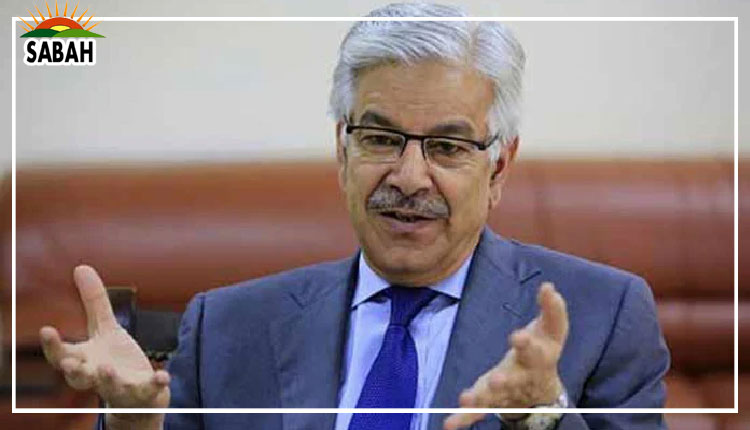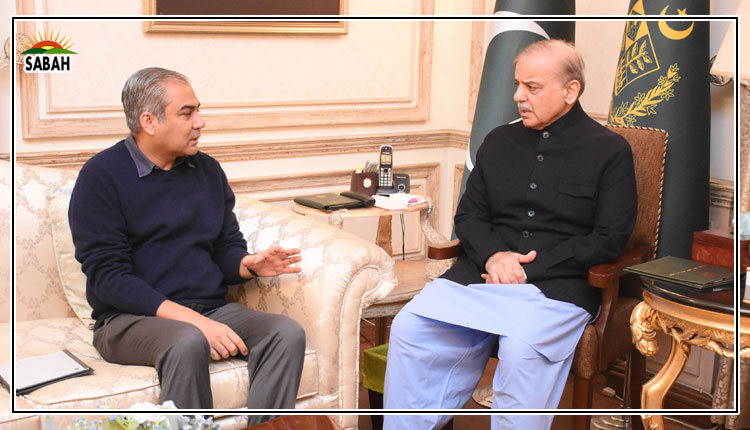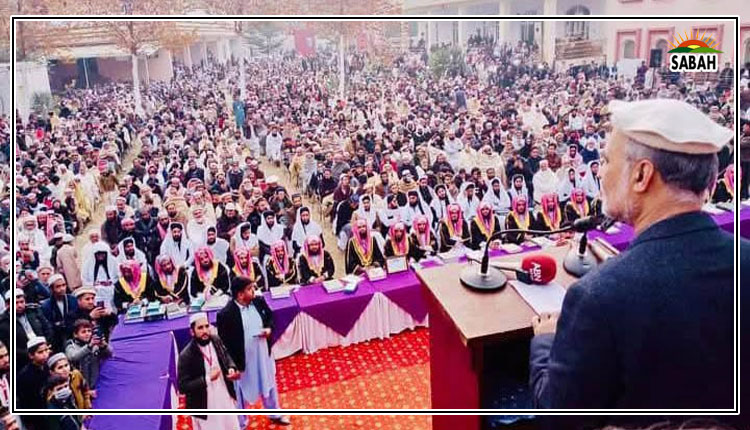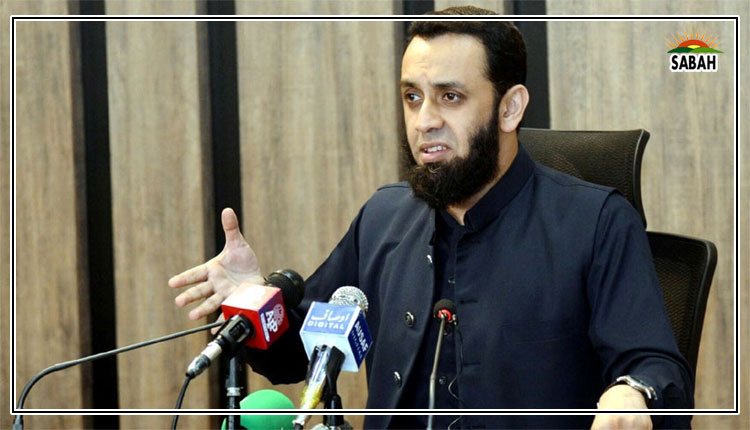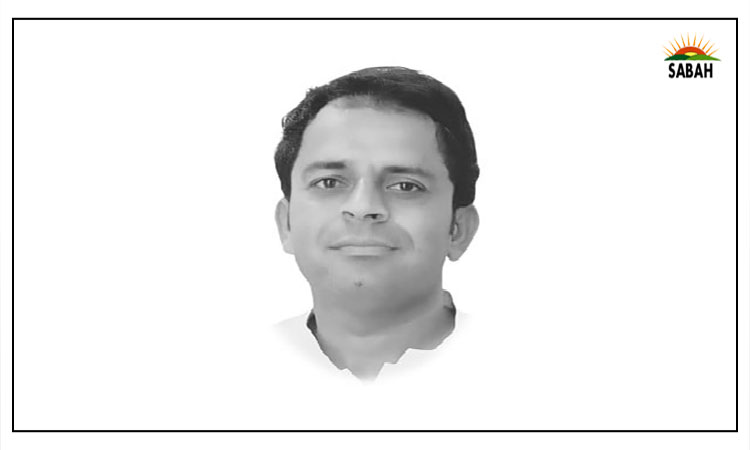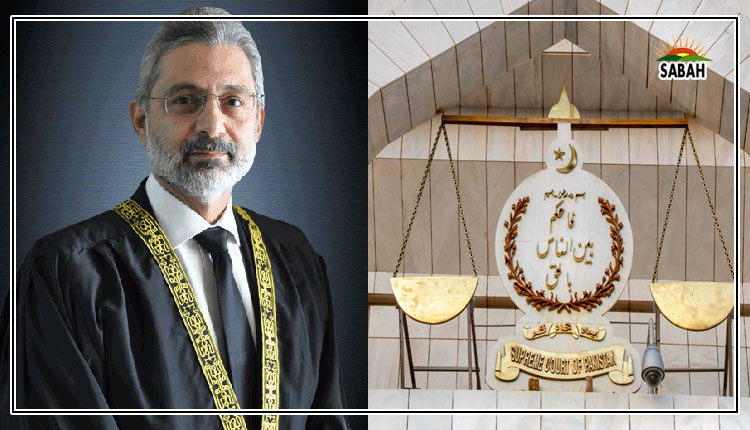It is a simple thing you have to prove yourself: CJP Qazi Faez Isa
ISLAMABAD, May 07 (SABAH): Chief Justice of Pakistan Justice Qazi Faez Isa has remarked that it is a simple thing you have to prove yourself, adding that there is a no tool present with the bureaucrat but we enjoy contempt of court and criminal powers and if we did not use them it is our own weakness. He said that there is a difference between the falsehood and criticism, adding that in recent past a commissioner spoken lie and whole media aired it, adding that no one asked whether you have any proof or not. He said that this did not happen abroad as the defamation laws are strict there and your pocket will be emptied. He said that the mistake should be pointed out immediately and accused should be informed that you are doing this. Meanwhile justice Jamal Khan Mandokhail remarked that the government was not doing anything regarding the alleged interference in judicial matters.
Six-member larger bench headed by Chief Justice of Pakistan (CJP) Qazi Faez Isa on Tuesday resumed the suo motu hearing on six Islamabad High Court (IHC) judges’ letter accusing agencies meddling in judicial matters. The bench also comprises Justice Syed Mansoor Ali Shah, Justice Jamal Khan Mandokhel, Justice Athar Minallah, Justice Musarrat Hilali and Justice Naeem Akhtar Afghan.
At the outset of the hearing, Attorney General for Pakistan Mansoor Usman Awan requested the court for more time to present his arguments as he had not received a copy of the April 30 hearing. Stating that he also had to speak with Prime Minister Shehbaz Sharif on the matter, he sought time till tomorrow (Wednesday).
CJP Isa then inquired the counsels of the bar councils and associations how long they would take to present their arguments. The top judge said that first, counsels representing lawyer organisations would be heard and then those who are pleading on behalf of individuals.
Upon Justice Isa’s directive, the AGP then read aloud the short order from the last hearing, as well as an additional note penned by Justice Minallah.
“As highlighted by all the high courts, this is the most serious and grave matter undermining the independence of the judiciary, which cannot be trivialised,” he quoted Justice Minallah’s note as saying.
At one point, Justice Minallah remarked that the federal government should “clarify its position”.
The CJP then summoned the PBC lawyer to the rostrum, noting that its members had submitted separate responses and could “not come on a single page even for the judiciary’s independence”.
Justice Minallah asked the counsel if it would not have been better to summon a meeting and agree on a unanimous response. “Whatever their opinion was, it is equally important,” he added.
The chief justice then remarked, “If the goal is the same… there is no controversial or political matter […] surely you both would be standing on the same side.”
Reading out an excerpt of the IHC judges’ letter pertaining to the SJC, the PBC lawyer said that the “segment may be referred to the SJC in order to provide guidance and some appropriate amendments or insertions may be made to the code of conduct for judges regarding their interactions with the executive in such circumstances”.
Noting the allegations in the letter regarding a secret camera in a judge’s house, Riazat Ali Sahar said the alleged offences fall within the scope of criminal offences.
The PBC suggested the formation of a judicial commission comprising one or more sitting judges to probe the matter to “thoroughly investigate the allegations and fix responsibility”, the lawyer stated.
“Nevertheless, judges of the honourable high courts and subordinate courts possess the authority to prosecute any individuals who interfere with the judicial work under section 228 of the Pakistan Penal Code,” Riazat Ali Sahar said.
“It is imperative to establish a precedent for prosecuting such individuals to serve as a deterrent in society and uphold the sanctity of the judicial forces,” he emphasised. The counsel then read out section 228 of the PPC and 482 of the Code of Criminal Procedure.
At one point, Justice Minallah observed, “One of the high courts has gone to the extent of saying that it’s a phenomenon which amounts to the subversion of the Constitution. The PBC has probably not formulated its recommendations while considering those reports.
“Speaking for myself, it is not just the six judges’ letter; they have highlighted a formula which has existed,” he added, asking what deterrence can be created when the Faizabad sit-in judgment had also failed to do so.
The counsel then said “judges should be encouraged to exercise existing laws”, at which CJP Isa summarised that the PBC was suggesting a probe and that the judges use the criminal laws to deal with the issue.
At this point during the hearing, Supreme Court Bar Association (SCBA) President Shahzad Shaukat came to the rostrum and stated that the remarks made in the last hearing pertaining to “superior court judges being compromised” were “eroding public trust”.
To this, Justice Minallah said, “We have lied for 76 years [and] hidden the truth, which has absolutely eroded our credibility.”
“The truth should come from somewhere else. After sitting here, you’re actually accepting that you were complicit,” the SCBA president said, at which Justice Minallah remarked, “It is not I who said it, it is the attorney general who said it.”
Shaukat said it was “deeply concerning” that an April 29 judgment penned by Babar Sattar stated that the IHC judges’ letter was “not in the nature of a complaint […] it was a confidential intra-institutional correspondence that got leaked to the media and has attracted public debate”.
“Urgent inquiry is necessary to determine how the letter was publicised without first being addressed to the chairman and the members of the SJC. The individual responsible for its leakage must be identified and held accountable,” the SCBA president asserted.
He further contended that the association “reiterates that any attempts by other branches of the government to undermine this independence are unconstitutional and detrimental to the rule of law”.
“The SCBA urges the SC to reassert its constitutional authority and to ensure that mechanisms are in place to prevent any form of coercion or undue interference from state agencies,” Shaukat added.
He further said that the SCBA advocated for a “network of stricter law” which should be “designed to protect judges from pressure that can arise from other branches of the government or from within their own ranks”.
Noting that the superior courts were empowered to initiate contempt proceedings, Shaukat said, “It is crucial for a strong message to be sent to the Parliament and the executive institutions that no interference will be tolerated henceforth.”
He called for an inquiry to “determine what exactly transpired” and why the IHC judges “failed to act” under Article 204 of the Constitution to take contempt action.
“Incidents should be thoroughly investigated, reported and conclusively resolved,” the SCBA president said, adding that it was advisable for the SC to “devise a protective framework” in consultation with all high courts.
Shaukat further urged that the “social activities of judges should be governed by specific guidelines within the code of conduct” and that they should “avoid engagements with litigants, lawyers, associates or friends involved in their cases”.
The lawyer went on to state, “Any kind of trolling of any honourable judge for maintaining any opinion he has independently cannot be permitted.
Here, Justice Minallah observed, “Judges have to rise above these things. No criticism, no matter how vicious, can affect the judge or the judge’s integrity or credibility.”
Terming the events of Nov 3, 2007 as the “biggest contempt of court”, he said the SC back then failed to initiate contempt proceedings despite its order being violated and judges being detained.
“How can you expect a district judge to speak up against interference?” Justice Minallah asked.
Here, Justice Mandokhail noted that there should be fair criticism on social media but people should not be misled.
CJP Isa then said: “There is a big difference between criticism and lies.”
“There was a commissioner here, and he spoke lies, and the media ran those lies,” the top judge said, noting that in people abroad even went bankrupt over defamation cases.
“Just start telling the truth, forget about the punishment,” Justice Isa said. In his arguments, IHC Bar Association lawyer Syed Ahmed Hasan Shah contended that interference in the judiciary could be from the administration, within the judiciary or social media.
He said that the power of suo motu had been used in the wrong manner in the past, terming it a “sort of interference”. Hasan added that the judiciary’s independence was not just the SC’s responsibility at which CJP Isa remarked, “Working for the judiciary’s independence is our duty; not yours.”
Justice Isa said the judges who face martial law and dictators “should be appreciated”, adding, “The judges who did not take oath under Provisional Constitutional Order and left are heroes.”
The hearing was adjourned for an indefinite period till the availability of the bench.



